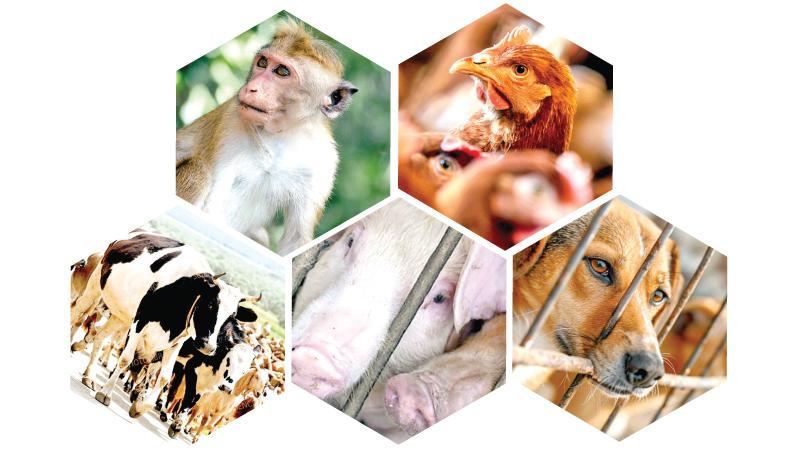The country’s Animal Welfare Act, dating back to 1907, remains woefully outdated, with penalties and fines for offences failing to serve as a deterrent. Despite mounting evidence of animal cruelty, including the recent brutal case of a dog beaten to death in Galle and widespread animal abuse incidents and unethical slaughter practices, the long-overdue Animal Welfare Bill is yet to be passed.
Animal rights activists across the country call for urgent action emphasising the need to pass new laws to address the rampant mistreatment of animals. At the same time, animal lovers remain hopeful that this new Government will give this pressing issue the attention it deserves.

Attorney-at-Law Lalani Perera
The Sunday Observer spoke to Attorney-at-Law Lalani Perera, a well-known animal welfare activist and key member of the Animal Welfare Steering Committee to understand the current status of the Animal Welfare Bill and explore how soon it might become law. Perera also served as the Additional Secretary (Legal) at the Ministry of Justice.
Excerpts
Q: You played a significant role in drafting the Animal Welfare Bill, which even received Cabinet approval in 2022. However, its enactment was postponed under the previous government. What steps have you taken under the current government to expedite its passage in Parliament?
A: The struggle to get the Animal Welfare Bill enacted has already taken two decades and continues to this day.
Even at this moment, my attention has been drawn to a local TV station’s exposure of the utter cruelty meted out to a dog that was mercilessly assaulted, leading to its death in extreme pain. Such cruelties continue unabated.
Before the last Presidential and Parliamentary elections, our group met the incumbent Prime Minister Dr. Harini Amarasuriya, and Industry and Entrepreneurship Minister Sunil Handunetti and we are hoping to meet the Justice Minister Harshana Nanayakkara soon to get the Bill enacted without further delay.
The Bill was recommended by the Sri Lanka Law Commission, to replace the country’s archaic Prevention of Cruelty to Animals Ordinance of 1907, totally inadequate to deal with the increasing incidents of horrendous animal cruelty. Today, where many nations recognise animals as Non-Human Persons and not mere chattel, Sri Lanka which boasts of a rich animal-friendly cultural heritage has only an outdated Prevention of Cruelty to Animals Ordinance enacted in 1907.
The Bill, which underwent comprehensive public consultation, was based on global animal welfare norms and conveyed an important message that animal cruelty will not be tolerated.
Despite tremendous public agitation and a 2019 Court of Appeal directive for its expeditious enactment, it was only in 2022 that it received Cabinet approval, on the recommendation of the then Agriculture Minister, and finally placed on the Order Paper of Parliament.
At the time of the last dissolution of Parliament on September 24 this year, the only remaining step was to debate the Bill and pass it. Unfortunately, on the verge of the Bill being debated, with the majority of Parliamentarians supporting it, it was misinterpreted as an obstacle to agricultural growth, by a few politically connected to agriculture giving flimsy excuses that the government would lose votes of the farmers, if animals used for agriculture are required to be treated humanely! This unnecessarily stalled the Bill, preventing its debate, and resulting in the Bill lapsing when Parliament was last dissolved.
Several past Election Manifestos since 2006, have pledged to introduce laws to prevent animal cruelty.
The current government’s task is easy, as all the spade work is done. The lapsed Animal Welfare Bill can easily be revived and presented for approval by Parliament.
Q: Do you foresee any new challenges in getting the Animal Welfare Bill passed in Parliament now? If so how do you plan to address them?
A: I see no challenges. All challenges raised during the preparation of the Bill have been successfully resolved.
Q: What are the key provisions in the Bill that you believe would significantly transform the current state of animal welfare in the country
A: Defining “animal” widely to include any living being other than a human being; recognising a plethora of new offences attracting deterrent punishments; providing strong implementing mechanisms; regulating methods of animal transport; regulating the sale of pets; regulating the use of animals for experiments; prescribing strict conditions for the humane slaughter of food animals; and addressing the lethargy of the police to treat animal cruelty incidents effectively.
Q: As an animal welfare activist, do you feel that there is sufficient public awareness and understanding of animal welfare issues in the country? If not, what measures do you suggest to improve this?
A: There are many people, at different levels of society who lovingly care for animals. But, for others, there is a need to create public awareness that animals are sentient beings and they too have a right to life and a safe environment. There have been instances when aged dogs, who have served their masters so faithfully, being abandoned when they are of ‘no use’. There are also instances where cattle owners sell their cows to the butcher when the animals are of no use, despite the animals having nourished them and their children with milk and rendered other services. Why cannot their services be acknowledged with an iota of gratitude – at least give them a safe place to spend the rest of their lives?
Q: How do you assess the level of empathy and commitment among policymakers towards addressing animal welfare concerns?
A: Recently, I have noticed a more encouraging trend.
However, a few past policymakers have displayed rather comical behaviour with one even recently saying, at a Parliamentary Oversight Committee meeting, that all dogs must be killed.
Animal welfare activists can only hope that the new policymakers will promote the animals’ right to life and provide legislative and other measures to enhance their well-being rather than making irresponsible statements without considering humane ways to overcome any issues.
Also, why allow issues to escalate, when they can be addressed humanely at inception? Attempts to resolve such issues in inhumane ways lead to public outcries as in the current widely condemned issue relating to monkeys.
Q: How can civil society organisations and the general public contribute to ensuring the Bill gets the attention and support it needs for timely enactment?
A: For these purposes what is most important is continuous lobbying and wide exposure of cruelty incidents.









